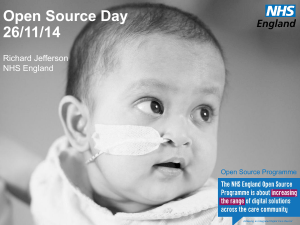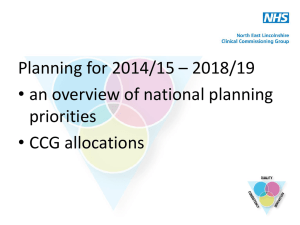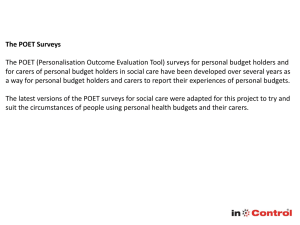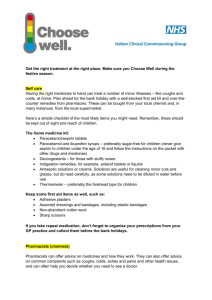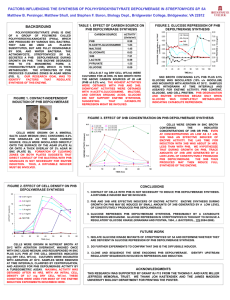A personal health budget is an amount of money to - Jan
advertisement
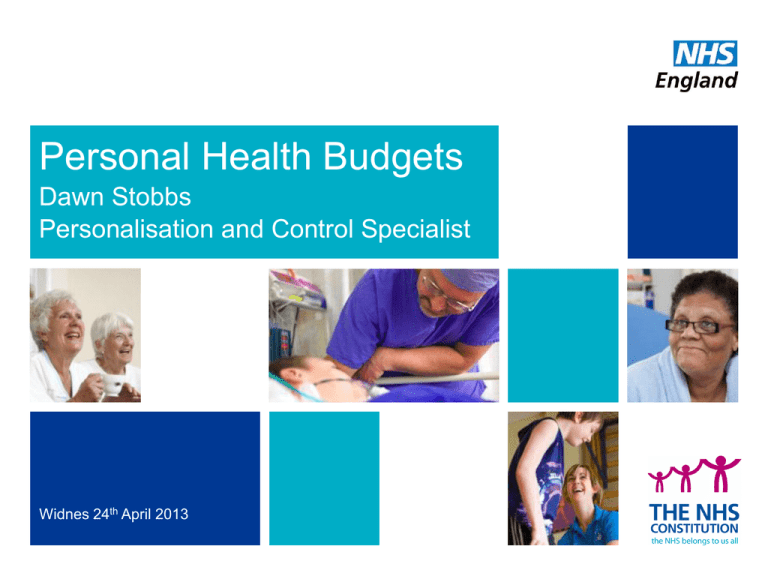
Personal Health Budgets Dawn Stobbs Personalisation and Control Specialist Widnes 24th April 2013 Personal Health Budgets? What are they? What have we learnt? What happens next? Widnes 24th April 2013 2 NHS | Presentation to [XXXX Company] | [Type Date] Personal Health Budget • A personal health budget is an amount of money to support a person’s identified health and wellbeing needs, planned and agreed between the person and their local NHS team. • The vision for personal health budgets is to enable people with long term conditions and disabilities to have greater choice, flexibility and control over the health care and support they receive. • Personal health budgets offer the opportunity for people to work in equal partnership with the NHS about how their health and wellbeing needs can best be met. • Personal health budgets are not about new money, but about using resource differently The essential parts of a Personal Health Budget The person (or their representative) will: • be able to choose the health and wellbeing outcomes they want to achieve, in agreement with a healthcare professional • know how much money they have for their health care and support • be enabled to create their own care plan, with support if they want it, and the right information to make decisions • be able to choose how their budget is held and managed, including the right to ask for a direct payment • be able to spend the money in ways and at times that make sense to them, as agreed in their plan. Personal Health Budget Personal Health Budget • • Cannot be spent on: emergency care, planned operations, activity covered by the GP contract, anything illegal, gambling, debt repayment, alcohol and tobacco or any service that an individual would usually make a contribution towards e.g. prescription charges. Can be used for goods, services and activities to meet an identified health outcome. Personal Health Budget: Examples • • • • Employ personal assistants to look after you at home. Alternative therapies e.g. for pain management instead of pain medication. Alternative activities to traditional day care or respite care. Alternative equipment and classes to help manage your condition. Evaluation Findings. Overall Positive • Positive impact on care-related quality of life and psychological well-being. • Did not have an impact on health status or healthrelated quality of life. (positive or negative) • Positive impact on peoples outcomes when: More choice and control Budgets with £1000 or more • Overall personal health budgets were cost effective. • But we still have much to learn Announcement November 2012 • Confirm objective in Mandate to NHS England • Confirm right to ask for NHS Continuing Healthcare recipients by April 2014 • Enabling NHS Commissioners to offer personal health budgets to others who may benefit • Current pilot sites will be able to continue to offer direct payments, until revision of the current legislation allows them more widely • Responsibility for delivery transferred to NHS England on 1st April 2013 Personal Health Budget. What now? • Delivery support around the country • Work looking at specific issues or areas where we need to learn more e.g. learning disabilities, budget setting, integration, workforce • More work to learn from and join up with other similar programmes and developments e.g. Special Educational Needs and Disabilities (SEND) pathfinder project • Continue to share learning and stories via the PHB toolkit and website. • Bring people together to network and share Useful Links and Contacts • Contacts: dawn.stobbs@nhs.net T: 07789741134 • PHB website www.personalhealthbudgets.england.nhs.uk • Evaluation Team website www.phbe.org.uk






